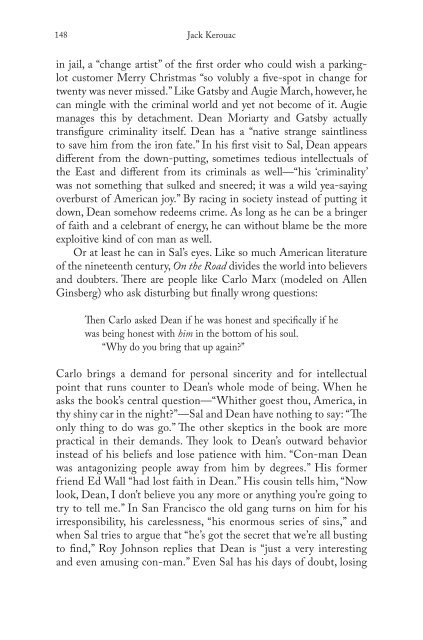Blooms Literary Themes - THE TRICKSTER.pdf - ymerleksi - home
Blooms Literary Themes - THE TRICKSTER.pdf - ymerleksi - home
Blooms Literary Themes - THE TRICKSTER.pdf - ymerleksi - home
Create successful ePaper yourself
Turn your PDF publications into a flip-book with our unique Google optimized e-Paper software.
148<br />
Jack Kerouac<br />
in jail, a “change artist” of the fi rst order who could wish a parkinglot<br />
customer Merry Christmas “so volubly a fi ve-spot in change for<br />
twenty was never missed.” Like Gatsby and Augie March, however, he<br />
can mingle with the criminal world and yet not become of it. Augie<br />
manages this by detachment. Dean Moriarty and Gatsby actually<br />
transfi gure criminality itself. Dean has a “native strange saintliness<br />
to save him from the iron fate.” In his fi rst visit to Sal, Dean appears<br />
diff erent from the down-putting, sometimes tedious intellectuals of<br />
the East and diff erent from its criminals as well—“his ‘criminality’<br />
was not something that sulked and sneered; it was a wild yea-saying<br />
overburst of American joy.” By racing in society instead of putting it<br />
down, Dean somehow redeems crime. As long as he can be a bringer<br />
of faith and a celebrant of energy, he can without blame be the more<br />
exploitive kind of con man as well.<br />
Or at least he can in Sal’s eyes. Like so much American literature<br />
of the nineteenth century, On the Road divides the world into believers<br />
and doubters. Th ere are people like Carlo Marx (modeled on Allen<br />
Ginsberg) who ask disturbing but fi nally wrong questions:<br />
Th en Carlo asked Dean if he was honest and specifi cally if he<br />
was being honest with him in the bottom of his soul.<br />
“Why do you bring that up again?”<br />
Carlo brings a demand for personal sincerity and for intellectual<br />
point that runs counter to Dean’s whole mode of being. When he<br />
asks the book’s central question—“Whither goest thou, America, in<br />
thy shiny car in the night?”—Sal and Dean have nothing to say: “Th e<br />
only thing to do was go.” Th e other skeptics in the book are more<br />
practical in their demands. Th ey look to Dean’s outward behavior<br />
instead of his beliefs and lose patience with him. “Con-man Dean<br />
was antagonizing people away from him by degrees.” His former<br />
friend Ed Wall “had lost faith in Dean.” His cousin tells him, “Now<br />
look, Dean, I don’t believe you any more or anything you’re going to<br />
try to tell me.” In San Francisco the old gang turns on him for his<br />
irresponsibility, his carelessness, “his enormous series of sins,” and<br />
when Sal tries to argue that “he’s got the secret that we’re all busting<br />
to fi nd,” Roy Johnson replies that Dean is “just a very interesting<br />
and even amusing con-man.” Even Sal has his days of doubt, losing

















